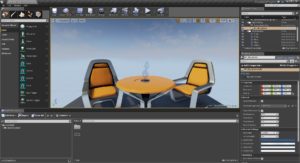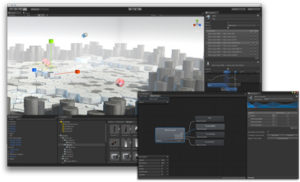The Stigma of Game Engines
Posted by Rampant Coyote on June 9, 2016
 These days, the question of whether or not to use an off-the-shelf game engine as a small, indie developer has largely been settled. The flood of games coming out these days has largely settled that. Sure, there are reasons for rolling your own… especially if you’ve already done so, it works, and is both familiar and can make competitive products. And there are reasons for using an off-the-shelf engine. If it does what you want… or can be modified to do what you want at a lower cost than creating your own… it makes sense.
These days, the question of whether or not to use an off-the-shelf game engine as a small, indie developer has largely been settled. The flood of games coming out these days has largely settled that. Sure, there are reasons for rolling your own… especially if you’ve already done so, it works, and is both familiar and can make competitive products. And there are reasons for using an off-the-shelf engine. If it does what you want… or can be modified to do what you want at a lower cost than creating your own… it makes sense.
These days, the amount of work required to get a base-level feature-set almost – but doesn’t quite – require a pretty solid set of off-the-shelf functionality if you are starting from scratch and need to get to market in a hurry. Making your own UI system may be a fun intellectual challenge (and if you are doing this as a hobby, and that’s what you are seeking, go for it!), but it’s not trivial to make a business case for doing so.
But then there’s this other bit… a stigma surrounding using a pre-built game engine. Rob Remakes wrote about this stigma recently, and that article is probably more worth reading than whatever I might say about the subject.
Now, there are perception issues. And more-than-perception issues. Earlier game engines were not as general-purpose as they claimed to be. I’ve released a game with one of those engines, and I know that all too well. You’d end up either spending your time fighting the engine and rewriting stuff (and then fixing all the problems your changes inevitably cause), or you go with the flow, and end up with a game that bears a bunch of hallmarks of its origin… warts and all. Yeah, that was a problem. You end up with games that “all look alike” when they come from the engine.
 RPG Maker has that problem now, because it’s not a very general-purpose engine, although it has improved quite a bit over the last decade from what I’ve been able to tell. So it’s better… but lets be honest. It’s based on a subgenre of games that were remarkably similar to each other to begin with, and they were all custom engines.
RPG Maker has that problem now, because it’s not a very general-purpose engine, although it has improved quite a bit over the last decade from what I’ve been able to tell. So it’s better… but lets be honest. It’s based on a subgenre of games that were remarkably similar to each other to begin with, and they were all custom engines.
So there’s that. And the associated problem that games built with the same off-the-shelf tools and pieces end up looking too much alike. That’s a real problem. In this world of over-saturated entertainment, your game needs to stand out. If someone looks at your game and says, “Oh, another generic Unreal-based FPS” or “a basic RPG Maker game,” then it’s a problem. That’s probably a more experienced audience – not the ones Rob was talking about – but you don’t want to narrow your audience down to just “inexperienced gamers who don’t know any better.”
From my perspective, I kinda understand the reaction, assuming it’s anything like my own. The problem is that back in the old days, you could perhaps gauge the quality of the game by the quality of the screenshots. If the programmer put together poor netcode, you could guess the rest of the game was likewise junky. If it was a crappy game, the lack of quality was visible throughout. In that way, you could judge a book by the cover.
In this wild, wonderful world of cheap, high-quality game engines, those easy metrics no longer work. A game could look beautiful in screenshots, but only because it’s using all the engine defaults and some quality off-the-shelf content in the screenshots, and the rest of the game is boring, buggy crap. I’ve played those. The game engine branding on the front can act as a warning: “Everything you’ve seen is just a facade. Don’t expect much.”
 I think what that really means is that we’re losing our shortcuts to judgment, and we should get used to the idea. Game engines are a great equalizer, not quite putting the pro and the newb on equal footing, but raising the lower bar of quality. But so far, nobody’s come out with an engine with a single button that says, “Make my game.” Yeah, some folks are doing horrible hack-jobs trying to sell games that are little more than a “starter kit” with the serial numbers filed off. That’s … not so good.
I think what that really means is that we’re losing our shortcuts to judgment, and we should get used to the idea. Game engines are a great equalizer, not quite putting the pro and the newb on equal footing, but raising the lower bar of quality. But so far, nobody’s come out with an engine with a single button that says, “Make my game.” Yeah, some folks are doing horrible hack-jobs trying to sell games that are little more than a “starter kit” with the serial numbers filed off. That’s … not so good.
But aside from that, making a game is still very hard work. The fact that so many more people are doing it because game engines are taking a lot of the scut work out of it? That’s a good thing. Even if it means more crappy games clogging the market. Or being able to be creative and focus on making a game instead of spending all your time working on the engine? That’s also a good thing.
Those who really, really want to do it themselves, from … some facsimile of scratch? Hey, more power to you. I respect that, too. That’s hella fun. But that’s not an automatic mark of superiority. As a developer, I’m kinda interested in how it was made. But from my customer / gamer perspective, I just want something great to play.
Filed Under: Game Development - Comments: 3 Comments to Read
Brian said,
And this is why having a competent artist is so important to marketing a new game. ‘rpg maker default’ is only marginally better than old ‘coder art’, especially when it comes to ‘pixel art’.
Rampant Coyote said,
You speak truth.
CdrJameson said,
RPG Maker MV is infinitely better than previous versions.
It’s now written in Javascript (rather than in hidden Ruby) so you can actually get it to do what you want fairly easily, and fix it up when it doesn’t.
Game engines definitely shape what you build. I have a knack for trying out a new engine with a simple design, and finding that I’ve picked exactly the kind of thing it doesn’t do. At which point the inflexibility kicks in and makes it harder than starting from scratch.
And I agree – art is the best indicator that you’ve put in some effort. On a Kickstarter it’s essential.